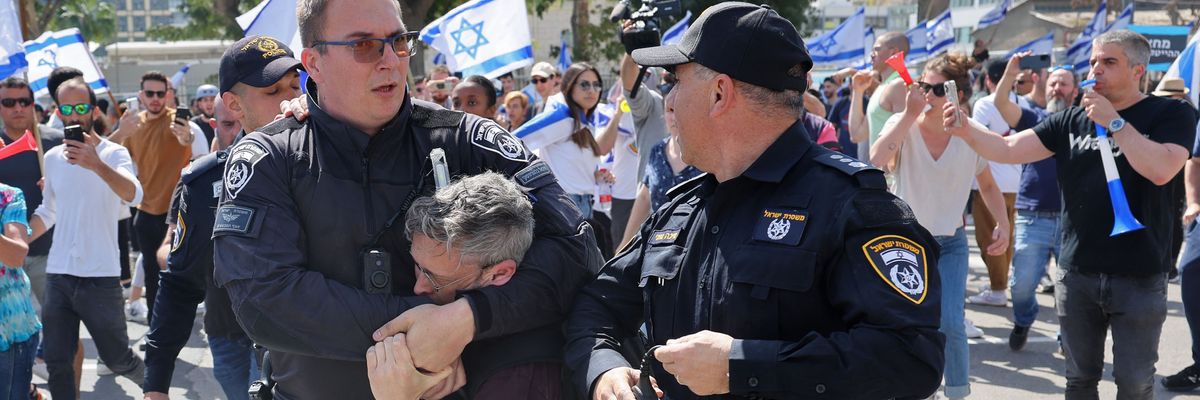Under fire for pushing what critics have decried as an authoritarian overhaul of Israeli's judicial system, the country's right-wing government directed police to respond with force on Wednesday as thousands of people marched, blocked traffic, and rallied to protest the plan.
Protests broke out in cities across Israel as part of what organizers called a "national day of disruption" to condemn the government's plan to weaken the justice system, as lawmakers voted on several proposals.
Police deployed stun grenades, tear gas, and water cannons to disperse protesters in Tel Aviv, where demonstrators tried to block one of the country's major highways. At least 11 people in the city were injured, the Middle East Eye (MEE)reported.
The public uprising was condemned as "anarchy" by Prime Minister Benjamin Netanyahu as his government pushed to pass several proposals as part of the judicial overhaul.
National Security Minister Itamar Ben-Gvir called on police to break up the protests and show "zero tolerance," according to MEE.
"We will not allow a civil uprising and anarchists to block major roads," Ben-Gvir said.
Haaretz journalist Judy Maltz reported "total mayhem" on the streets of Tel Aviv as police targeted one protester with a water cannon.
As the demonstrations unfolded and police arrested 39 people in Tel Aviv alone, the Constitution, Justice, and Law Committee in the Knesset approved a proposal to give Supreme Court justices the authority to strike down laws only if it has the approval of 12 out of 15 judges. Currently, the court can strike down legislation that violate Israel's 13 basic laws.
The panel also approved a clause allowing lawmakers to reinstate a law that's been disqualified by the Supreme Court with a simple majority, further limiting the high court's ability to counter laws that are unconstitutional.
Two other proposals—to legalize the death penalty in terrorism cases and to restrict the attorney general's ability to declare the prime minister unfit for office—were also passed by the Knesset in a preliminary hearing, and proceeded to the Constitution, Justice, and Law Committee.
The Israel Democracy Institute conducted a recent poll that found 66% of Israelis oppose the curtailing of the Supreme Court's authority.
In Tel Aviv Wednesday, demonstrators shouted, "We are the majority and we are out in the streets!" and "Shame!" as security forces cracked down on the protests.
Towards the end of the day, more than a thousand people convened in front of Netanyahu's home in Jerusalem after marching through the city.
Yonatan Touval, an analyst at the Israeli Institute for Regional Foreign Policies, told MEE that the uprising represents "the only chance for the government's agenda to fail."
The protests "stand a chance at preventing and perhaps at the very least slowing down the legislative agenda of the government," he said.
MEE noted that Palestinian citizens of Israel largely boycotted the demonstrations, as they believe they are "excluded" from the goal of the protesters—preserving the Supreme Court, which has supported evictions of Palestinians from land illegally occupied by Israel.
"It's very hard for Palestinians to join these protests that wish to preserve the judicial status quo—which has been deepening the oppression of Palestinian citizens of Israel and deepening the apartheid in the West Bank," Rami Younis, an independent Palestinian journalist, told MEE.

